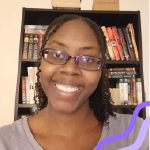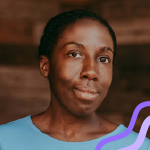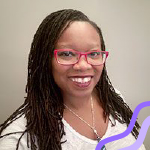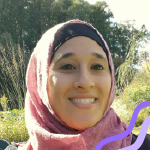How To Build Diverse Collections

Complete a collection audit in this transformative online workshop and guest speaker program October 18, 25, and November 1, with live sessions at 2 pm Eastern Time.
Extend your learning and save more by pairing this course with its companion course, Jumpstart Inclusive Cataloging, a 1-day workshop starting Nov. 8. View bundle discounts at registration.
Course Overview
Guest speaker sessions via Zoom:
Tuesdays, October 18, 25, and November 1, from 2:00-4:30 pm ET (recordings available)
Workshop:
Asynchronous, facilitator-led workshop over 3 weeks
Library collections must be diverse and inclusive, offering windows into, and reflections of the vast array of people, stories and experiences that make up our world.
In this course, you’ll learn from an outstanding group of experts as they explore key concepts essential to cultivating and promoting inclusive and equitable collections. You’ll conduct a diversity and inclusion audit of your collections, and hear about ways to include wider perspectives from and about LGBTQIA people, Black, indigenous, and people of color, and historically underrepresented ethnicities, cultures, and religions. You’ll learn how to ensure that your collections are more reflective of the diversity of your community and the larger world.
You’ll complete assignments to complete a diversity and inclusion audit over 3+ weeks in an interactive online classroom environment with personal coaching from an expert in the field. In addition, you’ll have access to our foundational bonus content—rich supporting materials you can explore at your own pace, including a series of webinars from Library Journal and School Library Journal contributors, readings, activities, and videos.
Speakers
|
Kymberlee Powe (she, her) |
Jennifer Baker (she, her) |
Carson Williams (he, him) |
Dr. Sonja Cherry-Paul (she, her) |
Check out the program tab for the full speaker roster.
The transformational speaker program has given thousands of librarians the tools and vision for meaningful change. The live sessions run on Tuesdays, October 18 and 25, and November 1, from 2:00-4:30 pm ET (recordings available) with an ongoing facilitator-led workshop over 3 weeks. Don’t miss this opportunity!
This is a companion course to How to Build an Antiracist Library Culture, which we recommend taking before or after How to Build Diverse Collections.
When you sign up early, you’ll have immediate access to our Diverse Collections Early Access On Demand Resources—a series of webinars from Library Journal and School Library Journal contributors along with rich, supporting materials in the form of readings, activities, and videos—to explore at your own pace.
Learning Objectives
When you attend this interactive online course, you’ll come away with:
-
The ability to assess current library collections, book promotions, and displays through a diverse lens in order to assess gaps in collections and service areas.
-
An understanding of key diversity and cultural literacy concepts such as white privilege, unconscious bias, cultural appropriation, and intersectionality.
-
The ability to recognize common problematic stereotypes, tropes, and microaggressions in media.
-
The ability to assess the diversity and inclusiveness of current collection development and RA practices.
-
Guidance on planning and executing a diversity audit.
-
Tools, tips, and advice on how to better diversify collections and displays.
-
A plan of action to better diversify your library collections and address gap areas that will transform your understanding of your library users and the services you provide.
Who should take this course
Any educator or librarian wanting to learn how to build and maintain diverse collections.
Live sessions are also available on demand
Can’t make a live session? All guest speaker sessions are recorded and available on demand following the initial broadcast. Asynchronous workshops allow you to complete assignments and receive feedback from experts.
Certificate of completion provided
15 professional development credits are available
For support with online courses, please contact libraryjournal@edmaker.co
Group Rates
Have a team attend and increase your impact!
Discounted registration fees are available for groups of 3 or more. When you register your team for our online courses, they will be placed in the same small workshop group, where discussions and project-based assignments receive feedback from an experienced librarian.
Send us a request for a quote.
If your group prefers to work separately, just let us know.
Course Curriculum Advisor

Robin Bradford, Collection Development Librarian, Pierce County Library System (WA)
Recognized as a leader in the management and coordination of library collections, Robin Bradford has extensive experience managing library collections, budgets, vendors, contracts, and services. She is a highly regarded speaker on the subject of library collection development and has been an integral part of Library Journal courses for the past several years.
By registering for this event you confirm that you have read and agree to our Code of Conduct.
For support with online courses, please contact libraryjournal@edmaker.co.
Week 1: Tuesday, October 18, 2022
Session 1 | 2:00-2:45 pm ET
Creating Inclusive Library Collections
While it’s important to ensure our collections are diverse, what does it mean to ensure they are truly inclusive? In this session, we’ll discuss why moving toward inclusive library collections is a crucial step in advancing equity and justice at our institutions. You’ll learn from an expert how to assess your collections as they are now, and hear what considerations to make when ordering and weeding. We’ll also touch on how to address some of the challenges to materials in your collection and how to advocate for underrepresented voices that must be included.
Speaker:
|
|
Kymberlee Powe, (she, her) Children and YA Consultant, Connecticut State Library Division of Library Development |
Workshop Q&A | 2:45-3:00 pm ET
An introduction to this week’s assignment and an overview of what to expect from the online workshop in this course
Session 2 | 3:00-3:45 pm ET
Conducting a Diversity Audit of Your Collections and Ordering: Where to Start
In this session, we’ll discuss the process of conducting a diversity audit of both your collections and your ordering. You’ll learn how to plan a diversity audit, which salient data points should be included, how to gather the requisite information, and how to set goals to address gaps. We’ll discuss the step-by-step process for establishing your diversity audit and how to make diversity and inclusion natural and ongoing parts of collection management and promotion.
Speakers:
|
|
Betsy Bird, (she, her) Collection Development Manager, Evanston Public Library (IL) |
|
|
Dontaná McPherson-Joseph, (she, her) Collection Management Librarian, Oak Park Public Library (IL) |
Session 3 | 3:45-4:00 pm ET
Auditing Your Non-Fiction Collection
Can we apply the same audit process to all of our collections, both fiction and non-fiction? In this session, you’ll learn where the processes align, and where they differ, including top tips and considerations for your non-fiction collection audit. You’ll come away with a framework for assessing your current non-fiction collections and the vital information you need to know to make progress on your goals.
Speaker:
|
|
Veronica Wells, (she, her) Assistant Dean for User Services and Programs, University of the Pacific |
Week 2: Tuesday, October 25, 2022
Stereotypes, Tropes, and Cultural Appropriation: A Collection Development Deep Dive
Some common stereotypes in books and media are easy to spot—others require a more fine-tuned understanding of culture and history. In this series of enlightening sessions, you will learn how to spot problematic stereotypes and tropes and how to avoid unintentionally perpetuating such depictions. You will hear from several experts in the field about the ways that specific identities—Native American, Muslim, African American, and LGBTQIA+—are portrayed in mainstream media, their traditions misunderstood or misrepresented, and their stories appropriated by cultural outsiders. You’ll walk away with the knowledge you need to build a more representative, inclusive collection at your library or institution.
Session 1 | Black Representation in Library Materials | 2:00-2:30 pm ET
Speaker:
|
|
Jennifer Baker, (she, her) Writer, Editor, Advocate, and Founder, Minorities in Publishing podcast |
Session 2 | Muslim Representation in Library Materials | 2:30-3:00 pm ET
Speakers:
|
|
Mahasin Abuwi Aleem, (she, her) Senior Community Library Manager, Contra Costa County Library, Antioch Libraries (CA), Co-Founder, Hijabi Librarians |
|
|
Hadeal Salamah, (she, her) Lower and Middle School Librarian, Georgetown Day School, Washington DC |
Workshop Q&A | 3:00-3:15 pm ET
An introduction to this week’s assignment and an overview of what to expect from the online workshop in this course
Session 3 | Queer Representation in Library Materials | 3:15-3:45 pm ET
Speaker:
|
|
Carson Williams, (he, him) Collection Development Librarian, Cornell University (NY) |
Session 4 | Native American Representation in Library Materials | 3:45-4:15 pm ET
Speaker:
|
|
Kara Stewart, (she, her) Author, Teacher, Literacy Specialist |
Week 3: Tuesday, November 1, 2022
Session 1 | 2:00-2:45 pm ET
Inclusive Cataloging for Your Collections
Once you’ve begun auditing and diversifying your collections, it’s important to consider your cataloging. In this session, we’ll explore how to handle classification of materials with an inclusive and antiracist approach. We’ll discuss the history of classification systems such as Dewey and Library of Congress, address why these systems need to be reconsidered and updated, and what you can do at your library to improve the user experience of your catalog. We’ll also cover how to replace problematic headings, take a community-informed approach to new headings, and how to communicate these changes to your patrons and students.
Speakers:
|
|
Charissa Brammer, (she, her) Director, Library Research Service, Colorado |
|
|
McKinley Sielaff, (she, her) Academic Engagement Librarian, Colorado College (CO) |
Workshop Q&A | 2:45-3:00 pm ET
An introduction to this week’s assignment and an overview of what to expect from the online workshop in this course
Session 2 | 3:00-3:45 pm ET
Moving Beyond Representation: Doing More With "Diverse" Books
Young people’s ability to access books that serve as mirrors and windows is a critical conversation in literacy. During this presentation, you will gain greater clarity around what it takes to move beyond providing young readers access to books solely for the purpose of representation and the importance of doing so. You'll be provided with a toolkit for supporting young people as they read in ways that affirm the racial and cultural identities of those who have been marginalized, oppressed, and whose lived experiences are often silenced in literature. This toolkit will also support young people as they read in ways to develop their awareness about systems of inequities and determine ways to disrupt them.
Speaker:
|
|
Dr. Sonja Cherry-Paul, (she, her) Founder, Red Clay Educators, Author of Stamped (for Kids) |
For support with online courses, please contact libraryjournal@edmaker.co.
Online Course Preview
A preview of how we build your library skills and bring inspiration to your projects with our online learning experience.
Course Format
One-Week Timeline (Course Runs 3+ Weeks)
|
DAYS 1-2 On Demand |
DAY 3 2.5 hours |
DAYS 4-7 1-2 hours (optional) |
|
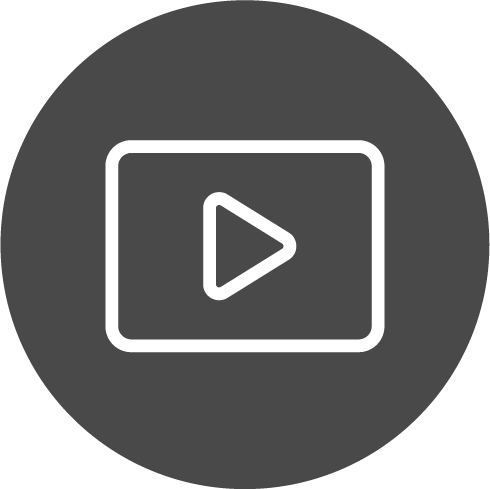 |
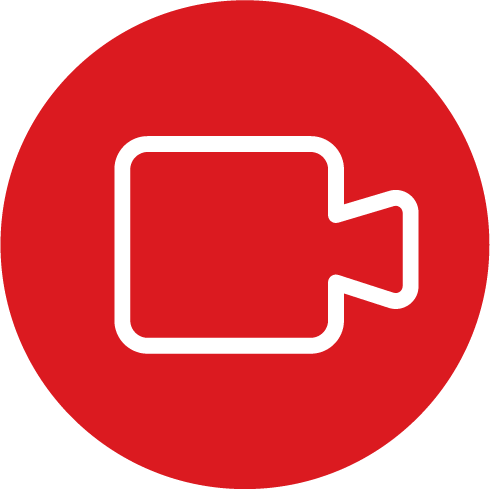 |
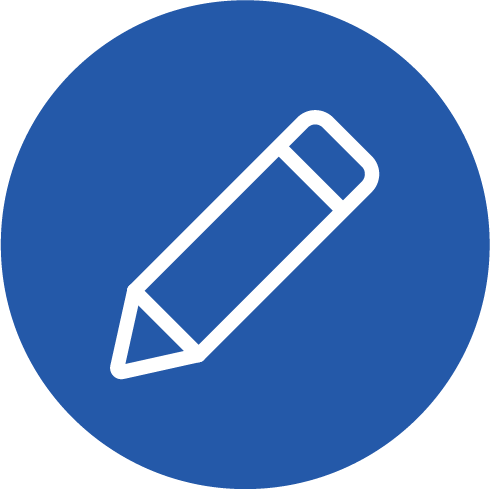 |
|
|
PRE-LIVE SESSION - Resources - Discussions - Bonus Content |
LIVE SESSIONS - Guest speakers via webcast - Q&A via chat - Recordings available on demand |
ASYNCHRONOUS WORKSHOP - Project-based homework, applied to your job - Personalized feedback from a facilitator - Group discussion in an asynchronous workshop setting via discussion forum |
3-WEEK WORKSHOP - Facilitator-led feedback WEEK 1 Establish goals and priorities WEEK 2 Prepare for your collection assessment WEEK 3 Begin audit or select materials for a collection |
Inspiring Live Guest Speakers + Facilitated Group Workshop for Project-Based Learning

Live session with Andrea Blackman and Tasneem Ansariyah Grace |
Live Guest Speakers Each Week
|
Online Course Features
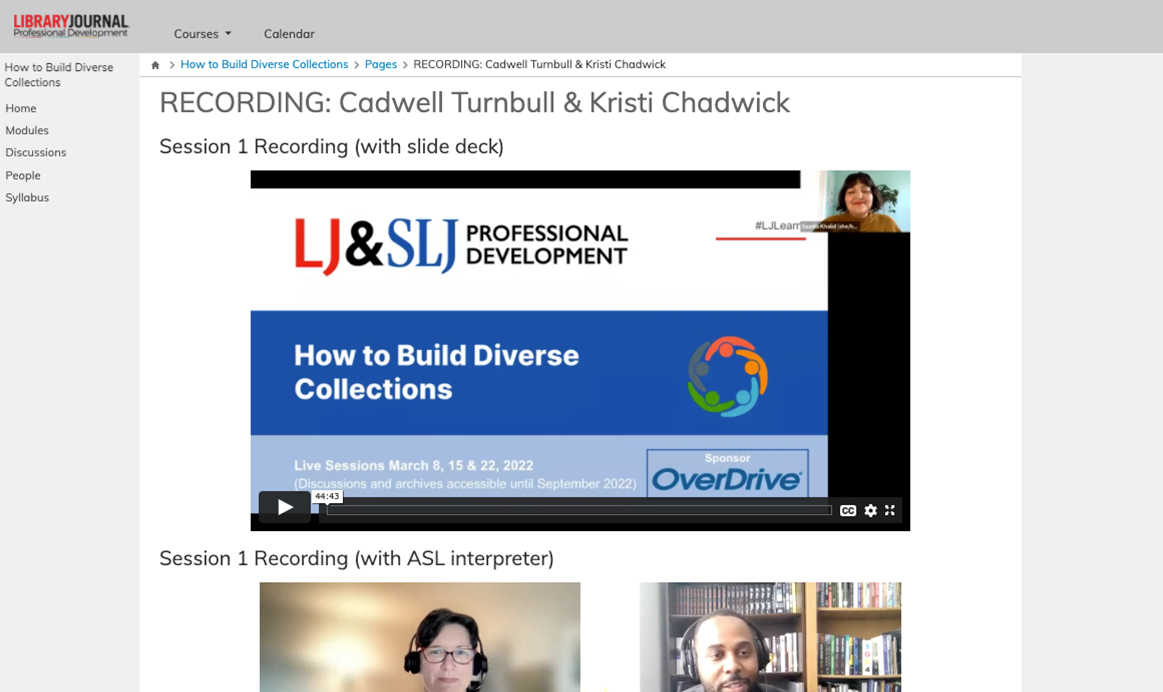
Recordings of guest speakers |
Recordings Available After The Live Session
|
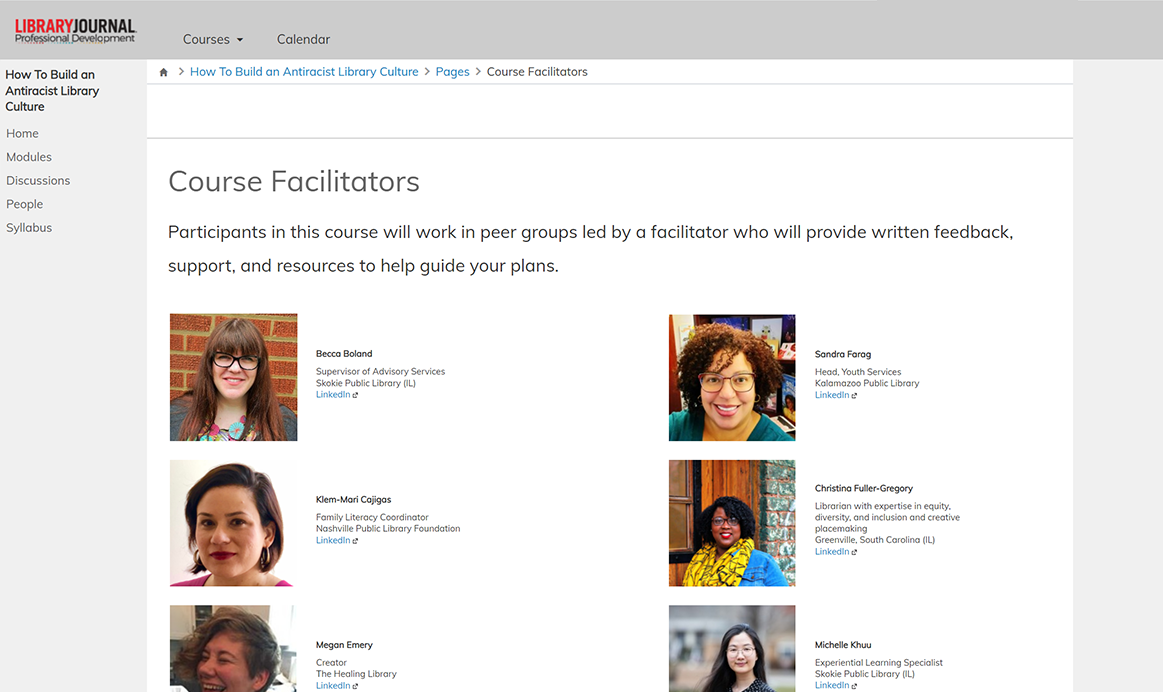
Facilitator-led workshop |
Online Classroom Organizes All Materials
|
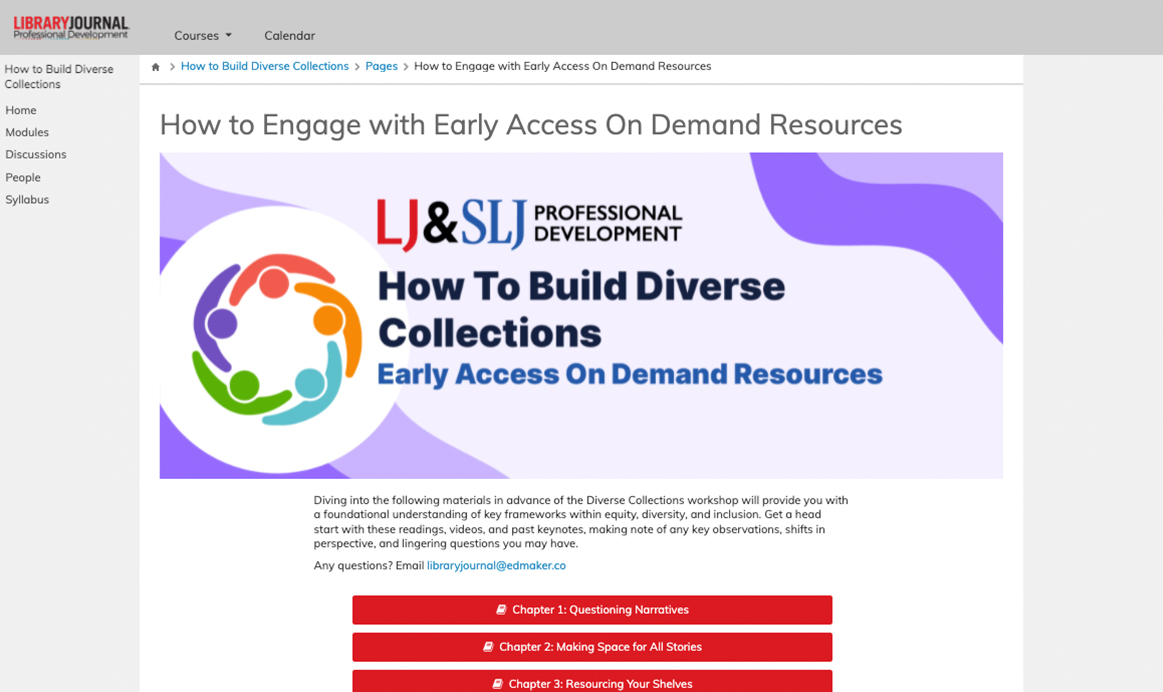
Early Access On Demand Resources |
Early Access and Ongoing Resources To Support Learning
|
ALREADY A SUBSCRIBER? LOG IN
We are currently offering this content for free. Sign up now to activate your personal profile, where you can save articles for future viewing


